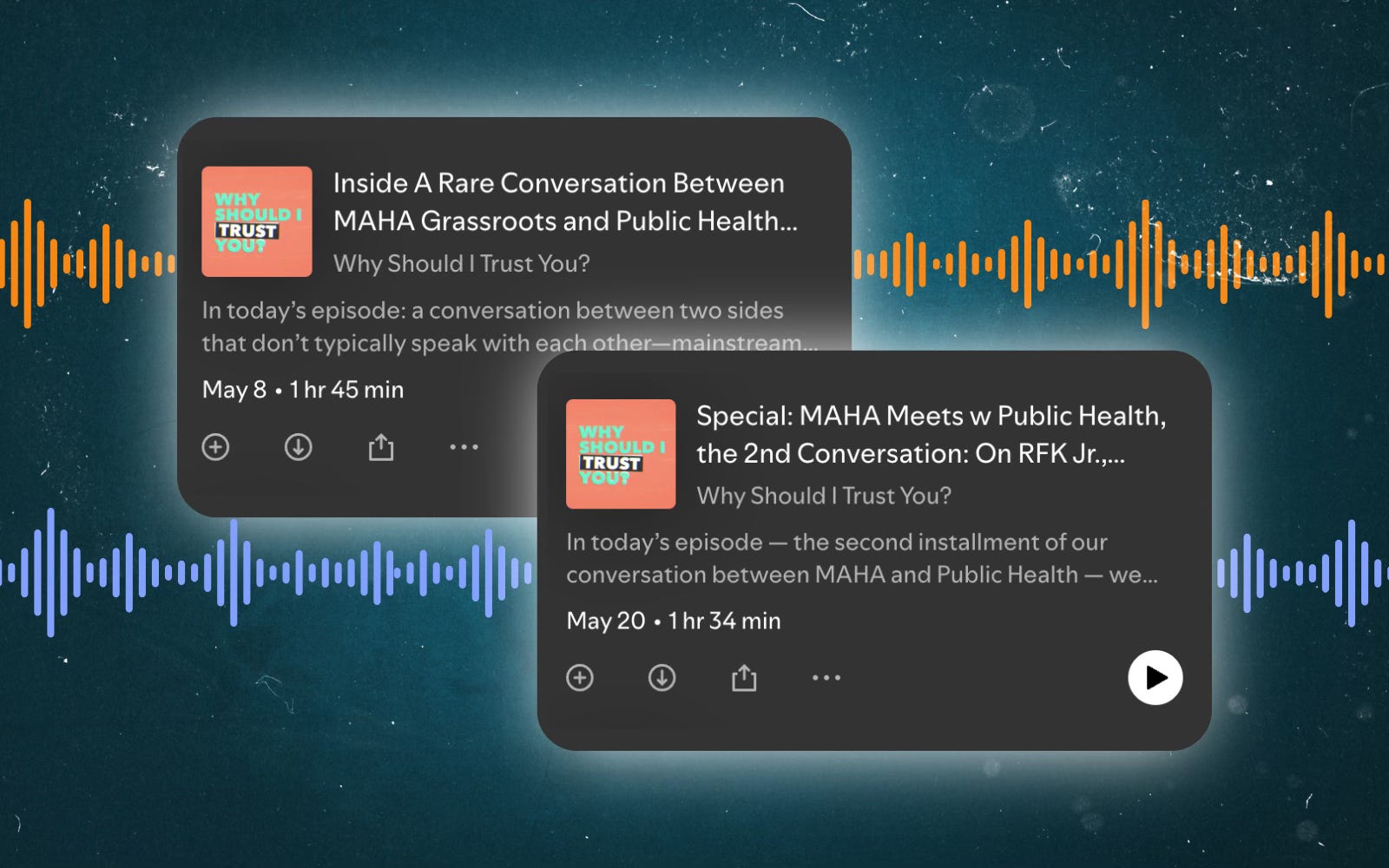What MAHA and Public Health Experts Actually Agree On
The Podcast “Why Should I Trust You?” has found common ground between activist leaders in the Make America Healthy Again (MAHA) movement and leading public health experts.
As health care has taken center stage in Washington, D.C., we have spent months meeting with members of Congress from both sides of the aisle. During these meetings, we found many shared concerns and goals in the rank and file of both the Democratic and Republican parties.
Brinda Adhikari’s podcast “Why Should I Trust You?” has found similar common ground between activist leaders in the Make America Healthy Again (MAHA) movement, which supported now Secretary of Health and Human Services Robert F. Kennedy, Jr., and leading public health experts. These podcast episodes included strikingly productive conversations between both sides that also shed light on the fact that MAHA and public health experts, and most of the country, likely have the same gripe with the health care system: the profit motive behind many of its actors.
The conversation probed the reasons for mistrust of the “establishment” public health officials and what MAHA supporters are looking for to feel heard. MAHA participants explained that the “revolving door” between public agencies and private industry sows mistrust in our existing public health system. They point to the case of the opioid epidemic, which was fueled by a public official who turned a blind eye to the addictive qualities of OxyContin and who later got a cushy job at Purdue Pharmaceuticals, the pharmaceutical company that invented OxyContin.
Another pitfall of the current health system, as described by the MAHA supporters, is the MAHA movement or any part of science and public health being the domain of one political candidate or party. This creates tension in a public health system that is meant to protect all people.
When the discussion turned to vaccine hesitancy in the MAHA movement, many participants described an “automatic” mistrust of data and information about a vaccine if the pharmaceutical company making it will profit from it.
One participant went on to explain that investors “muddy the water” by demanding profit and not having knowledge of the field or an interest in the effects on everyday people. Another participant described experiences in the business world in which multiple “independent studies” would be commissioned by a company because the results of the first one would hurt the company’s profits. They see similar structures at play in health care. One of the public health experts added that only around one-third of Americans have a primary care doctor, the doctor often most trusted by patients for medical information.
Looking back at the growing financialization of our health care system over the past decades, things like high drug prices, lack of access to primary care doctors, and obstacles to medical care have unsurprisingly driven mistrust in medicine.
As patients, MAHA or not, have been put through the ringer just trying to get their prescriptions approved and covered, it is almost impossible not to lose faith that our health care system and public health institutions have our best interests in mind. What we hope MAHA supporters and all patients reading this can understand is that it is not your doctors, medical providers, or public health officials who have caused this profiteering in our system. Instead, it is the years of free rein our government, during both Democratic and Republican administrations, has given big health care and insurance corporations to price-gouge us when we need care.
These podcast conversations provide a reason for hope that we can come together to fix our health care system. People from the public health world, the MAHA movement, and patients using the system are all tired of their health care and decisions being politicized and financialized. In thinking about the goals described by MAHA leaders in the conversations, to have trusted leaders who do not have a profit motive and are not influenced by corporations, we were reminded of how fire departments are viewed in this country.
Firefighters offer a public service that taxpayers are happy to pitch in for; they are not driven by any type of profit motive outside of their salary, and they are not seen as a group associated with either political party. In listening to these conversations with people from opposite ends of the ideological spectrum, it seems that treating health care more like our fire departments, by removing profiteers and making the ability to get the care you need non-political, could bring together even the most opposite viewpoints.
Rachel Madley is Director of Policy and Advocacy at the Center for Health & Democracy. She previously worked for Congresswoman Pramila Jayapal. She received her PhD from Columbia University and has written for publications including The New York Times.







No! No!
The alleged good stuff is entirely pre-existing, has nothing to do with MAHA (they attached themselves onto it after the fact) basic obvious evidenced based progressive stuff... pharma and insurance and big Ag as is corrupt. healthy diet and exercise (and education, housing, clean air, clean water, good work conditions, etc etc)... and we affirm all of that (because we came up with it before they attached themselves to it) without giving any credence and support for the homicidal RFK Jr (my wife and I trained some of the doctors & public health officials in American Samoa when RFJ Jr pushed anti-vax during a measles outbreak there) and his circle of wellness industry woo including the Surgeon General nominee.
But MAHA is complete b.s. and this the specific report itself is garbage AI generated filled with fictional references and numerous falsehoods.
The "full of woo wellness industry" is more fraudulent then pharma... same payola profit goals but with no oversight, regulatory protection, and twice the lying. That the same folks are cutting research funding, stopping vaccine development, making it harder to get existing vaccines, and threatening to bock publishing in legitimate journals.
None of the good stuff is going to actually get done given actual conservative movement corporatism, and the whole thing is to sucker folks in via the snake-oil hucksterism... and keep the fascism part. the only sciency part is that it b.s. m.s. phd... bullshit, more shit, piled higher and deept.
See:
https://wapo.st/45wdA6A
https://www.nytimes.com/2025/05/29/well/maha-report-citations.html?unlocked_article_code=1.LE8.hJmQ.G94r4UxcH6yS&smid=url-share
https://www.notus.org/health-science/make-america-healthy-again-report-citation-errors
https://digbysblog.net/2025/05/29/a-milestone-in-snake-oil/
https://digbysblog.net/2025/05/28/making-us-unhealthy-again/
https://www.lawyersgunsmoneyblog.com/2025/05/scientific-rigor-mortis
Yes. There is common ground among the grassroots on all political sides when it comes to the huge problems with our profit-based sickcare system. But how to counter the endless funds of Big Pharma that both political parties rely on for their campaigns? Until we crack that nut, nothing's going to change.